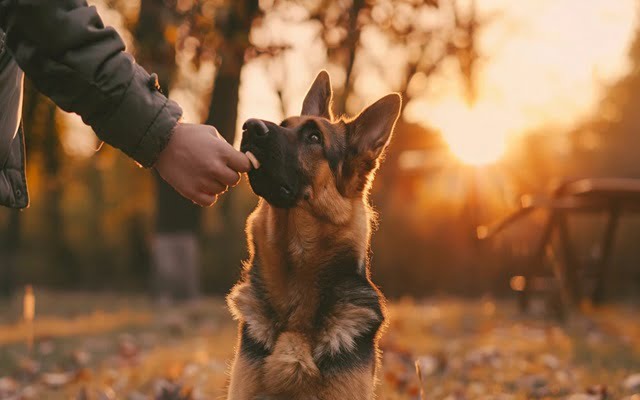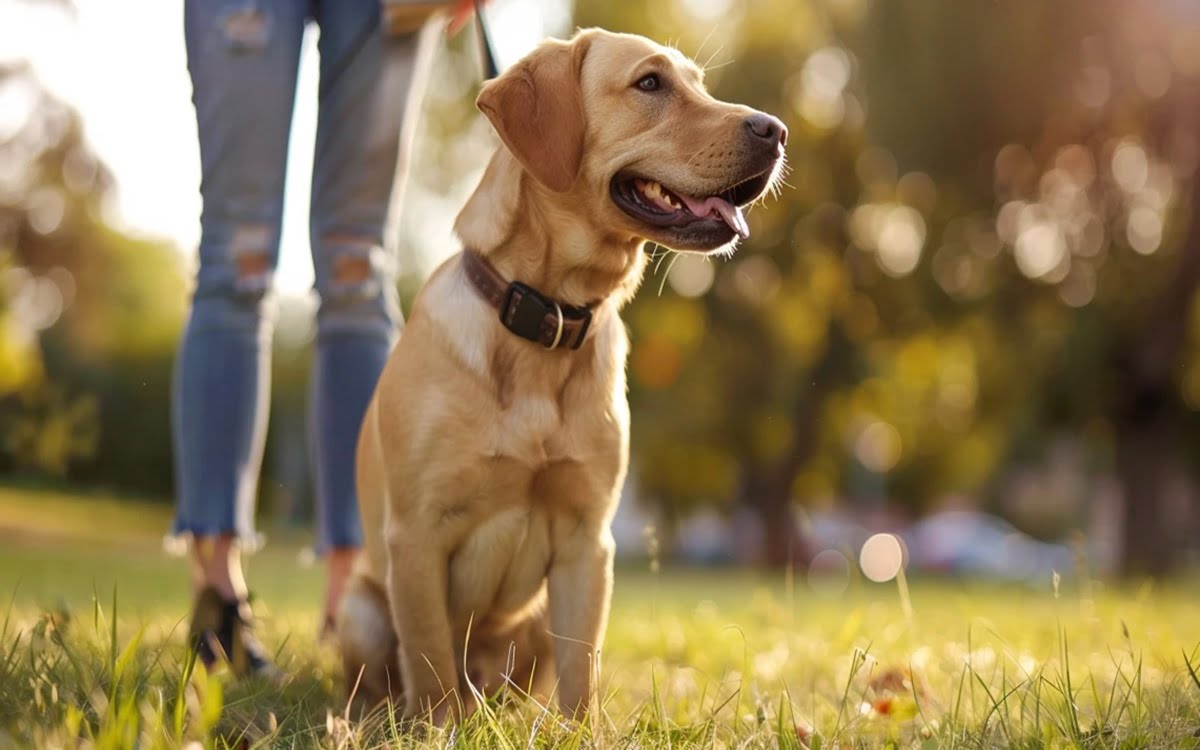My sweet old gal, Maggie, a golden retriever with a sprinkle of gray around her muzzle, just mastered skateboarding. Yep, you read that right. Skateboarding. Now, before you start envisioning Tony Hawk in a fur coat, let me assure you, it’s more of a slow roll with a happy tail wag situation. But the point is, this old girl proved the naysayers wrong.
So, if you’re nodding along, thinking, My senior pup is perfectly content napping in a sunbeam, I’m here to tell you that those golden years don’t have to be all about snoozing and drooling. Old dogs can absolutely learn new tricks, and trust me, it’s more rewarding than you might think.
In this guide, we’re ditching the old-fashioned notion that age equals stagnation. We’ll delve into the science that debunks the myth, explore the heartwarming benefits of training your furry friend, and dish out some pawsome tips to get you started. So, buckle up, buttercup, because it’s never too late to unleash your senior dog’s inner superstar.
Debunking the Myth: Old Dogs CAN Learn New Tricks
Let’s be real, the saying you can’t teach an old dog new tricks is about as outdated as a floppy disk. It’s simply not true! Just like us humans, our furry friends are lifelong learners. Their brains, while maybe not as spry as their younger days, are still incredibly adaptable.

Science-Backed Learning Power
Researchers have found that dogs’ brains retain a remarkable ability to change and form new connections throughout their lives. This neuroplasticity means that even senior dogs can learn new things, from basic commands to complex behaviors. It might take a bit longer, but the results are just as rewarding.
Senior Superstars: Tales of Triumph
Don’t believe me? Just ask Maggie the skateboarding golden retriever or the countless other senior dogs who have defied the odds and mastered agility courses, scent work, therapy dog training, and even musical freestyle . These heartwarming stories prove that age is just a number when it comes to learning.
The Power of Positivity
One of the keys to unlocking your senior dog’s learning potential is positive reinforcement. This means rewarding desired behaviors with treats, praise, and affection. Think of it like this: you wouldn’t want to learn something new if you were constantly being scolded, right? The same goes for our furry companions. Positive reinforcement makes learning fun and motivating, especially for older dogs who might need a little extra encouragement.
Benefits of Training Senior Dogs: The Gift That Keeps on Giving
Think of training your senior dog like a daily dose of vitamins – it’s not just about learning tricks, it’s about boosting their overall well-being. Here’s how those training sessions can be a game-changer for your furry friend

Physical Fitness for the Golden Years
Let’s face it, our senior pups aren’t as spry as they used to be. But that doesn’t mean they have to resign themselves to a life of couch surfing. Training sessions can incorporate gentle exercises that help maintain muscle mass, flexibility, and joint health. Think of it as a low-impact workout class tailored specifically for your dog’s needs.
Mental Gymnastics for a Sharp Mind
Just like our brains, dogs’ minds need to stay active to stay sharp. Training provides the mental stimulation that keeps those gears turning. Learning new tricks and commands challenges their cognitive abilities, preventing boredom and even slowing down cognitive decline. Plus, a mentally stimulated dog is a happy dog – and who doesn’t want that?
Deeper Bonds and Unbreakable Trust
Training sessions aren’t just about teaching “sit” and “stay.” They’re about spending quality time with your furry best friend. As you work together, you’ll strengthen your bond, build trust, and enhance communication. Your dog will look to you for guidance, and you’ll gain a deeper understanding of their needs and quirks. It’s a win-win for both of you.
Behavior Management Made Easy
As dogs age, they might develop certain behavioral quirks, like separation anxiety or house soiling. Training can help address these issues by providing structure, routine, and positive reinforcement for good behavior. It’s like giving your dog the tools they need to navigate their golden years with confidence and grace.
But Wait, There’s More!
The benefits of training senior dogs don’t stop there. Training can also help:
- Boost confidence and self-esteem
- Reduce stress and anxiety
- Provide a sense of purpose and fulfillment
- Enhance socialization with other dogs and people
Tips for Training Senior Dogs: A Tailored Approach for Golden Oldies
Alright, let’s get down to brass tacks! Training a senior dog is a bit like baking a cake – you need the right ingredients and a dash of patience. Here are some tips to whip up a successful training recipe

Consult Your Vet: A Checkup Before Check-Ins
Before you dive into a new training regime, take your furry friend for a check-up with your veterinarian. This is crucial, especially for senior dogs, as they may have underlying health conditions that could affect their ability to learn and participate in training. Your vet can give you the green light and offer personalized advice based on your dog’s specific needs.
Start Slow and Steady: No Need for Speed
Think of it like easing into a morning jog after a long hiatus – you wouldn’t want to sprint right out of the gate. The same goes for training your senior dog. Start with short, simple sessions and gradually increase the duration and complexity as your dog gets the hang of things. Patience is key here, folks!
The Power of Positive Reinforcement: Treats, Praise, and Belly Rubs!
Positive reinforcement is the secret sauce to successful dog training, especially for older pups. Reward your dog for every little victory, whether it’s mastering a new trick or simply paying attention during a training session. This could mean anything from a tasty treat to a heartfelt good boy! or a belly rub that sends them to cloud nine. The goal is to make learning an enjoyable experience for both of you.
Short and Sweet Sessions: Less is More
Senior dogs might not have the stamina of their younger counterparts, so keep those training sessions short and sweet. Aim for 5-10 minute bursts throughout the day, rather than one long, drawn-out session. This will help prevent your dog from getting overwhelmed or fatigued. Remember, quality over quantity!
A Personalized Approach: Every Dog is Unique
Just like us, every senior dog is an individual with their own quirks and preferences. Some might be eager to learn, while others might need a bit more coaxing. Some might thrive on physical challenges, while others might prefer mental puzzles. The key is to tailor your training approach to your dog’s unique personality and abilities.
Patience, Grasshopper: Rome Wasn’t Built in a Day
Don’t expect your senior dog to become a canine Einstein overnight. Learning takes time, especially for older dogs who might be set in their ways. Be patient, understanding, and celebrate every little milestone along the way. Remember, progress is progress, no matter how small it might seem.
Training Tools and Techniques for Senior Dogs
- Interactive Toys: Puzzle toys and treat-dispensing toys can provide mental stimulation and keep your dog engaged during training sessions.
- Clicker Training: This method can be a great way to clearly communicate with your dog and mark desired behaviors.
- Hand Signals: Incorporating hand signals along with verbal commands can be helpful for dogs with hearing loss.
- Slower Pace and Repetition: Older dogs might need things to be broken down into smaller steps and repeated more often.
Addressing Common Challenges in Senior Dog Training: Overcoming Hurdles with Grace
Let’s be honest, training a senior dog isn’t always a walk in the park (pun intended). But fear not, my fellow dog lovers, because with a little understanding and a few adjustments, you can tackle these common challenges head-on:
The Energy Dip
Remember those days when your pup could fetch a ball for hours on end? Yeah, those days might be behind you. Senior dogs tend to have less energy than their younger counterparts, so it’s important to adjust your expectations and training schedule accordingly. Keep sessions short and sweet, offer plenty of breaks, and avoid training during the hottest parts of the day.
Health Hurdles
Arthritis, vision or hearing loss, and other age-related conditions can present challenges during training. If your dog has any health concerns, talk to your vet about modifications that can make training more comfortable and effective. This might involve using hand signals instead of verbal commands for dogs with hearing loss or opting for low-impact activities for those with joint issues.
The Motivation Mystery
Some senior dogs might be less enthusiastic about learning new tricks than their younger counterparts. Don’t worry, it’s not that they’re stubborn, they just might need a little extra motivation. Experiment with different rewards to find what gets your dog’s tail wagging. This could be a special treat, a favorite toy, or even just a good old-fashioned belly rub.
Special Considerations for Senior Dogs
- Warming Up: Before starting a training session, give your dog a few minutes to warm up their muscles with some gentle stretches or a short walk.
- Cool Down: After training, allow your dog to cool down and rest. This will help prevent injuries and ensure they don’t get overtired.
- Mental Breaks: If your dog seems to be losing focus or getting frustrated, take a break and try again later. Remember, training should be fun for both of you!
Success Stories and Inspiration: Proof That Old Dogs Rock!
Get ready for a dose of pure canine inspiration! These heartwarming tales of senior dog success will have you cheering for more:
- Maggie the Skateboarding Sensation: Remember our skateboarding golden retriever, Maggie? She didn’t just hop on a board and roll with it. It took weeks of gentle encouragement, tiny steps, and a whole lot of treats. But the joy on her face as she cruised down the sidewalk made it all worthwhile.
- Max the Therapy Dog Extraordinaire: Max, a 12-year-old Labrador, thought his retirement days would be filled with naps and belly rubs. But when his owner started volunteering at a local nursing home, Max discovered a new calling. He became a certified therapy dog, bringing smiles and comfort to residents with his gentle presence and wagging tail.
- Bella the Agility Ace: Despite her arthritis, Bella, a spunky terrier mix, refused to slow down. With the help of a supportive trainer and a modified agility course, she continued to compete well into her senior years. She even inspired other senior dogs to give agility a try.
These stories are a testament to the resilience, adaptability, and unwavering spirit of our senior dogs. They remind us that age is just a number and that with a little love, patience, and encouragement, our furry friends can achieve incredible things. So, don’t let those gray hairs fool you – your senior dog is still capable of so much more than you might think!
FAQ
Is there a specific age when it becomes too late to teach a dog new tricks?
No, there isn’t a magic cut-off age for learning! While puppies may pick up tricks faster due to their sponge-like brains, senior dogs are still capable learners. The key is to tailor your training approach to their age and individual needs.
My senior dog seems less motivated to learn. How can I spark their interest in training?
As dogs age, their motivation for food rewards may decrease. Experiment with different types of rewards like praise, petting, or a favorite toy. Additionally, keep training sessions short and fun, focusing on games and activities your dog enjoys.
My old dog has arthritis. Are there any tricks I can teach them without putting stress on their joints?
Absolutely! Opt for low-impact tricks that don’t require jumping or twisting. Focus on mental stimulation like “touch,” “find it,” or even learning the names of their toys. Even gentle walks combined with basic obedience commands can be a great way to exercise their mind and body.
Can training a senior dog with cognitive decline still be beneficial?
While training a dog with cognitive decline may be challenging, it can still offer benefits. Simple, familiar commands can provide mental stimulation and a sense of accomplishment. Focus on maintaining existing skills and fostering a positive emotional connection through gentle interactions and praise.

My job is to make sure every fact is right and every article is a joy to read. I’m kind of like a dog trainer for information – I make it behave!

